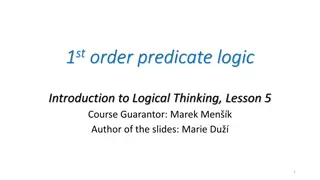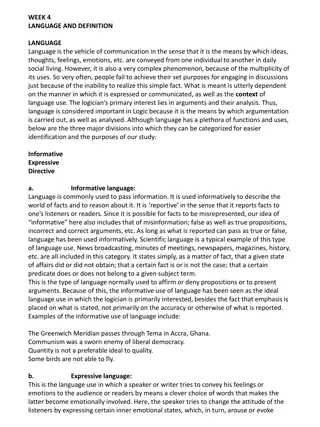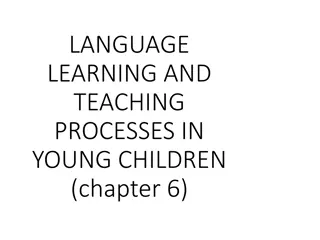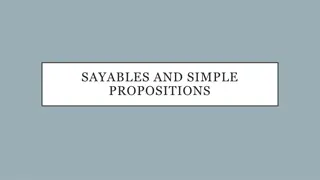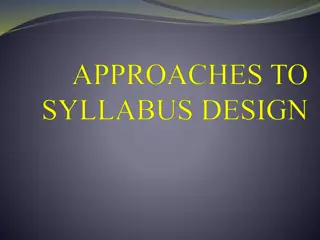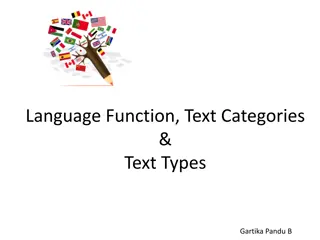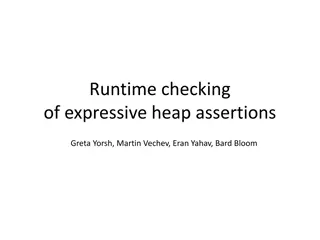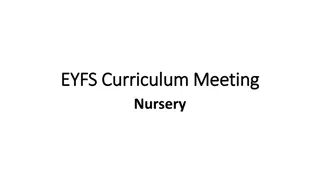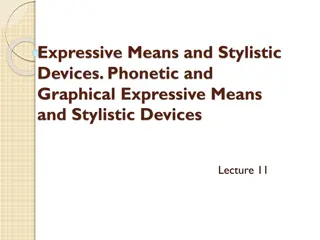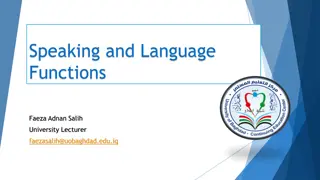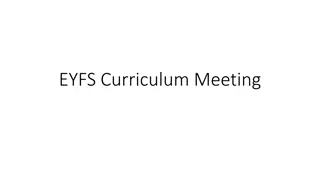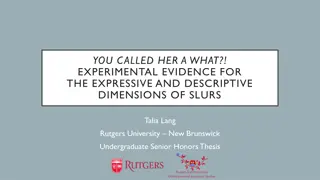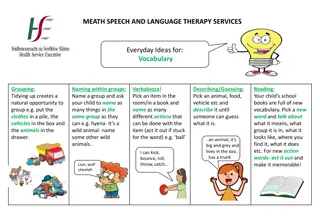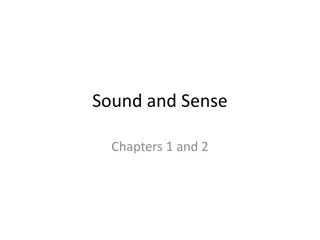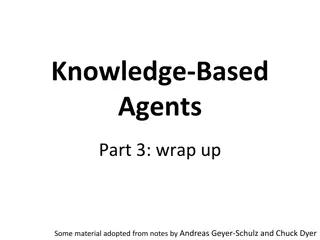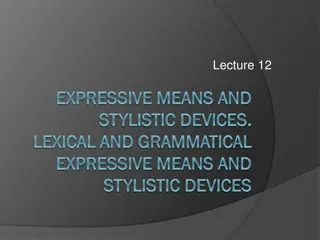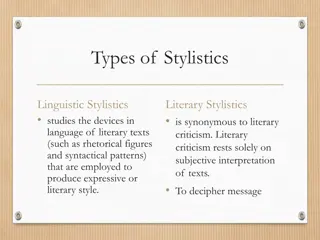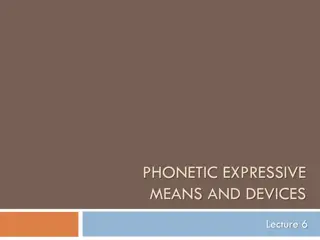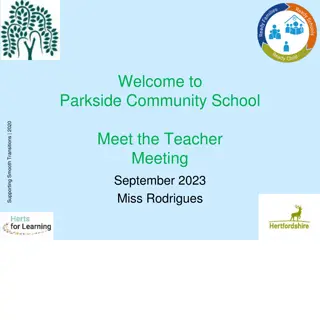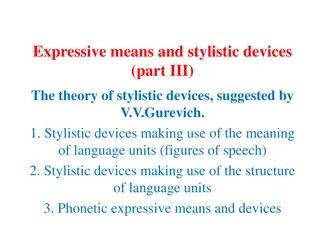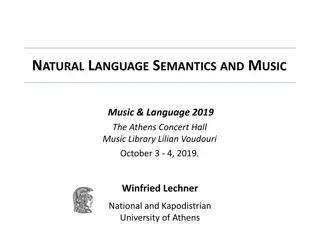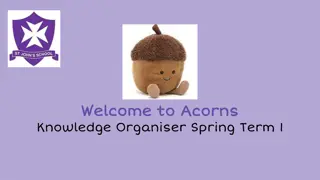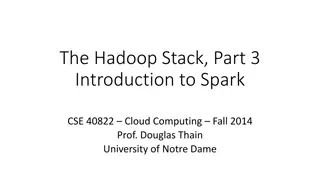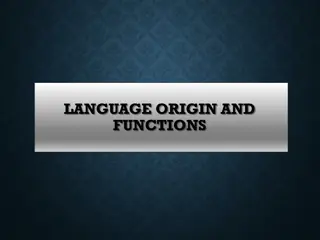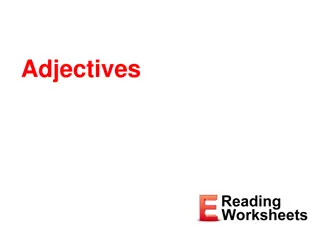Career Opportunities and Challenges in Translation & Interpreting Pedagogy Post-Pandemic
The APTIS 2022 conference explores new avenues in Translation and Interpreting (T&I) pedagogy amidst a changing landscape. Dr. Bego A. Rodriguez highlights emerging roles for T&I graduates. The context reveals a decline in language learning in the UK, impacting the Language Service Industry. The UK'
0 views • 13 slides
Language Study Community – Enhance Your Language Skills
Joining a Language Study Group is a fantastic way to take your language learning to the next level. By leveraging the power of Group Study, you can immerse yourself in the language, enhance your understanding, and build confidence in your speaking abilities. Read full article \/\/explainlearning.com
1 views • 3 slides
Academic Language Demands and Supports in Instructional Planning
Academic Language Demands and Supports are crucial in educational settings to ensure comprehension and usage of language by students. This content discusses embedding language demands in lesson plans, providing language supports, and peer review activities to enhance academic language skills. The fo
6 views • 10 slides
The Significance of Media in Language Learning
Media plays a crucial role in language learning by raising awareness of the ideology behind linguistic structures and providing valuable information on society and culture. Linguists are drawn to media language for research purposes and to understand its impact on language use and attitudes. Media s
12 views • 5 slides
Understanding Translation: Key Concepts and Definitions
Translation involves transferring written text from one language to another, while interpreting deals with oral communication. Etymologically, the term "translation" comes from Latin meaning "to carry over." It is a process of replacing an original text with another in a different language. Translat
11 views • 76 slides
Language and Communication in Society: Understanding Interactions
Explore the intricate relationship between language and society through lectures focusing on language in interaction, power dynamics, language contact and change, public space discourse, linguistic landscaping, and more. Delve into the shift from structural linguistics to societal communication, red
6 views • 28 slides
An Exploration of Stylistics in Linguistics: Expressive Means and Stylistic Devices 2. Stylistics as a branch of linguistics examines expressive means and stylistic devices which enhance the emotive and aesthetic qualities of language. These include
Stylistics, Linguistics, Expressive Means, Stylistic Devices, Language
5 views • 25 slides
Introduction to 1st Order Predicate Logic in Logical Thinking
Explore the limitations of propositional logic and the enhanced expressive power of 1st order predicate logic (PL1). Understand how PL1 allows for analyzing the structure of atomic propositions and proving arguments that depend on these structures. Through examples and valid argument schemata, delve
1 views • 26 slides
Understanding Language: Informative, Expressive, and Directive Uses
Language serves as a vital medium for communication, allowing the conveyance of ideas, thoughts, and emotions. It is a complex phenomenon with diverse uses. This text delves into the three major divisions of language use - informative, expressive, and directive. Informative language conveys facts, w
4 views • 6 slides
Language Learning and Teaching Processes in Young Children
Development of language in young children is influenced by various factors such as their cultural and linguistic environment, unique characteristics, and interactions with adults. Optimal language development requires language stimulation from the environment. Varied cultural practices impact langua
1 views • 51 slides
Understanding Language in Stoicism: Significance and Corporeality
Language in Stoicism plays a crucial role in the process of assenting to impressions by focusing on corporeality, reason, and truth. It distinguishes between the mundane vocal sounds, articulated speech, and significant language to convey meanings effectively. The significance of language lies not i
2 views • 13 slides
Understanding Language Teaching Syllabus: Integration, Theory, and Approaches
Language Teaching Syllabus involves the integration of subject matter and linguistic elements, guided by theories of language and learning. Various approaches like Grammatical, Situational, Communicative, and Analytic are used to structure syllabi. Breaking language into parts aids in sequential lea
1 views • 28 slides
Enhancing Language Learning Across the Curriculum in B.Ed. 1st Year Course
Language Across the Curriculum (LAC) emphasizes that language learning should occur across all subjects, not just in language classrooms. It highlights the importance of incorporating language development into every learning activity, fostering multilingualism in schools. Language plays a crucial ro
2 views • 34 slides
Understanding Language Functions, Categories, and Text Types
Explore the three main functions of language - Expressive, Informative, and Vocative - along with their characteristics and examples. Delve into language functions, text categories, and text types such as serious imaginative literature, authoritative statements, and vocative texts. Discover how lang
0 views • 8 slides
Runtime Checking of Expressive Heap Assertions
Motivated by the unreliability of large software systems due to concurrency bugs and limitations of static analysis, the goal is to enable runtime analysis of deep semantic properties with low overhead. This involves checking expressive heap assertions at runtime with minimal impact on performance,
0 views • 15 slides
Speech and Language Developmental Milestones: A Bilingual/Multilingual Perspective
Speech and language developmental milestones are crucial for children, regardless of their home language. These milestones encompass receptive language, expressive language, pragmatics, and articulation and phonology. Understanding how a child hears and talks from birth to one year is essential, as
1 views • 23 slides
Understanding the Early Years Foundation Stage (EYFS) Curriculum
The Early Years Foundation Stage (EYFS) curriculum in the UK is essential for children's learning and development from birth to 5 years old. It focuses on seven key areas, including personal, social, emotional development, physical development, and communication. The curriculum also covers specific
0 views • 12 slides
Understanding Expressive Means and Stylistic Devices in Language
Expressive means and stylistic devices play a vital role in intensifying language utterances, encompassing phonetic, morphological, lexical, word-building, phraseological, and syntactical forms. These tools help evoke emotions, logical emphasis, and additional meaning in communication. By utilizing
0 views • 13 slides
Exploring Swift: A Modern & Powerful Programming Language
Swift is a powerful and intuitive programming language designed for macOS, iOS, watchOS, and tvOS. It offers a concise yet expressive syntax with modern features that developers love. The language focuses on safety, speed, and ease of use, making it ideal for a wide range of applications from system
0 views • 7 slides
Understanding Language Functions and Types in Speaking
Explore the key functions of language, types of language functions such as expressive and directive, and learn how to use language functions effectively in speaking. Compare and contrast different language elements like determiners, adverbs, linking expressions, nouns, and verbs to enhance your comm
0 views • 26 slides
Understanding the EYFS Curriculum for Early Years Development
The Early Years Foundation Stage (EYFS) statutory framework in England sets standards for the learning, development, and care of children aged birth to 5 years old. It outlines seven areas of learning and development, including prime areas like personal, social, emotional development, physical devel
0 views • 11 slides
Exploring the Dimensions of Slurs: Expressive vs. Descriptive Aspects
Investigating the dual nature of slurs, this study delves into the expressive and descriptive dimensions of derogatory terms. Through experimental evidence and linguistic analysis, it explores how slurs convey both speaker-centered emotions and objective information about targeted groups. The resear
0 views • 45 slides
Introduction to Language Technologies at Jožef Stefan International Postgraduate School
This module on Knowledge Technologies at Jožef Stefan International Postgraduate School explores various aspects of Language Technologies, including Computational Linguistics, Natural Language Processing, and Human Language Technologies. The course covers computer processing of natural language, ap
0 views • 27 slides
Everyday Ideas for Enhancing Speech and Language Skills
Discover creative activities to boost vocabulary, memory, understanding, literacy, and expressive language skills in children. From grouping and naming exercises to memory games and literacy techniques, these daily ideas aim to make learning language fun and engaging.
0 views • 4 slides
Exploring Sociolinguistics: Language Variation and Social Factors
Sociolinguistics delves into the study of language variation influenced by social factors, examining the relationship between language and its social context. It explores various aspects like standard pronunciation, language choice, speech acts, language components, language variety, and factors suc
0 views • 73 slides
Exploring Poetry: Sound and Sense
Poetry is described as a multidimensional form of language that allows us to engage with experience through imagination. It intensifies communication to deepen our understanding of the world. The essence of poetry lies in experiencing emotions and thoughts in a profound and expressive manner. The ex
0 views • 9 slides
Understanding Knowledge-Based Agents: Inference, Soundness, and Completeness
Inference, soundness, and completeness are crucial concepts in knowledge-based agents. First-order logic allows for expressive statements and has sound and complete inference procedures. Soundness ensures derived sentences are true, while completeness guarantees all entailed sentences are derived. A
0 views • 6 slides
Understanding Assembly Language Programming for Computing Layers
Assembly language is a low-level programming language that enables direct interaction with a computer's hardware components. This content explores the fundamentals of assembly language, the relationship between human-readable machine language and binary code, an assembly language program for multipl
0 views • 31 slides
Understanding Lexical and Grammatical Expressive Means in Stylistic Devices
The lecture discusses various lexical and grammatical expressive means in stylistic devices, such as metaphor, personification, allusion, metonymy, synecdoche, irony, epithet, and oxymoron. These tools allow for creative and vivid expressions in language by playing with different meanings and associ
0 views • 22 slides
Understanding Linguistic and Literary Stylistics
Linguistic Stylistics explores devices in language of literary texts to create expressive styles. Literary criticism relies on subjective interpretation, while Stylistic Analysis in linguistics identifies patterns in speech and writing. This content delves into the phonological, graphological, and l
0 views • 17 slides
Understanding Language Anxiety in Foreign Language Learning and Teaching
Explore the impact of language anxiety on students and teachers in foreign language learning and teaching contexts through insights from Dr. Christina Gkonou's research. Delve into the theoretical background, implications for language education, and real-life experiences shared at the Essex Language
0 views • 25 slides
Understanding Phonetic Expressive Means and Devices in Language
Phonetic expressive means and devices are utilized to enhance the acoustic effect of speech, emphasizing the utterance and evoking emotions in the audience. These tools come into play both in oral and written forms of communication, directly through intonation and stress in spoken language and indir
0 views • 36 slides
Parkside Community School - Supporting Smooth Transitions and Early Years Foundation Stage Overview
Providing an overview of the Early Years Foundation Stage (EYFS) and what children will be learning, along with ideas for effective collaboration between school and home. Meet the dedicated team at Parkside Community School and learn about the key features of effective practice. Discover what your c
0 views • 20 slides
Exploring Stylistic Devices: Metaphor, Metonymy, Repetition, and More
Delve into the theory of stylistic devices proposed by V.V. Gurevich, covering figures of speech, structural devices, and phonetic expressive means. Discover examples of metaphors, metonymy, repetition techniques like anaphora and climax, along with their impact on language usage and expression.
0 views • 22 slides
Exploring the Relationship Between Language and Music
This presentation delves into the connection between language and music, examining the nuances of linguistic expressions, syntax, and meaning in both domains. It contrasts the formal structure of music with the combinatorial nature of natural language, discussing aspects such as denotation, referenc
0 views • 35 slides
Spring Term 1: Acorns Knowledge Organiser
Acorns Spring Term 1 focuses on Communication and Language, Personal, Social & Emotional Development, Physical Development, and Cognitive Skills. The curriculum encourages listening skills, storytelling, expressive language, emotional awareness, physical activities, and cognitive development through
0 views • 9 slides
Introduction to Spark in The Hadoop Stack
Introduction to Spark, a high-performance in-memory data analysis system layered on top of Hadoop to overcome the limitations of the Map-Reduce paradigm. It discusses the importance of Spark in addressing the expressive limitations of Hadoop's Map-Reduce, enabling algorithms that are not easily expr
0 views • 16 slides
The Origin and Functions of Language
Exploring the origin of language, this content delves into the historical perspective of when and how human language evolved. It discusses the role of language in human society, its functions in socialization, information exchange, commanding, persuading, and influencing. Additionally, it touches up
0 views • 8 slides
Prof's English World: Efficient Essay Writing Tips
Prof's English World presents a structured approach to essay writing, emphasizing planning, writing, and reviewing. Learn how to underline keywords, brainstorm ideas, select key points, and use expressive language to enhance your essays. Follow these steps to improve your essay writing skills and ex
0 views • 47 slides
Understanding Adjectives: Describing and Modifying Words
Adjectives play a crucial role in enhancing our language by describing or modifying nouns and pronouns. They add color, size, and depth to our words, making them more vivid and expressive. This article explores the function of adjectives with clear examples, showcasing how they bring life to our sen
0 views • 7 slides







